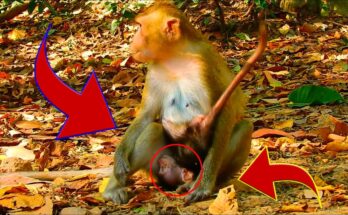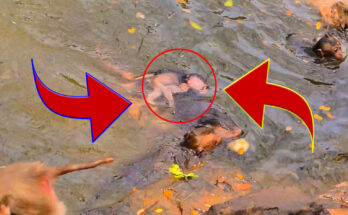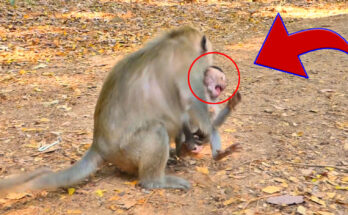The bond between a mother and her newborn is one of the most vital connections in the animal kingdom, ensuring the survival and health of the infant. However, when the mother is exhausted or unable to provide the necessary care, the consequences can be devastating. This is a reality that is sometimes seen in the animal world, including in primates like monkeys. One such scenario unfolded when a mother monkey, after giving birth, was left too exhausted to properly care for her newborn. The baby monkey was born unhealthy, and without immediate intervention, its chances of survival were slim.
The first days and weeks of life are critical for any newborn, including monkeys. Like many other mammals, monkeys depend on their mothers for warmth, nourishment, and protection. Newborn monkeys require constant care—breastfeeding for nutrition, physical closeness for warmth, and the emotional bonding that will eventually lead to social integration within the group. When these needs are not met, the health of the infant is at great risk. The situation becomes even more dire when the mother herself is physically depleted, making it difficult or impossible for her to fulfill her caregiving responsibilities.
In this particular case, the mother monkey, who had been under significant stress during her pregnancy, was left exhausted after the birth. Giving birth is an incredibly demanding process for any animal, especially for those in the wild or in less-than-ideal environments, where the threat of predators and the scarcity of food may add further strain to the mother. After the delivery, the mother was weak and fatigued, unable to keep her newborn close or provide the essential care it needed in its vulnerable state. The infant was left to face the harsh realities of the wild with limited care and no access to the warmth and comfort of its mother.
The infant, unable to latch onto its mother’s breast due to the mother’s exhaustion, became malnourished. Without sufficient nutrition, the baby monkey’s growth was stunted, and its immune system, which would have been bolstered by the antibodies from the mother’s milk, weakened. This made the newborn more susceptible to infections and diseases, which are often fatal to those who are not strong enough to fight them off. Additionally, the lack of a secure bond with its mother meant the infant was deprived of the emotional and physical reassurance necessary for its mental development and future integration into its social group.
In the wild, such a situation could easily end in tragedy. The infant monkey’s chances of survival without the mother’s care were slim, and without immediate intervention, the baby’s chances of thriving would be greatly reduced. However, in some cases, there may be opportunities for caregivers, such as wildlife rehabilitation centers or conservationists, to step in and provide assistance. These experts can offer the newborn the nutrients, warmth, and care it needs to survive. Yet, it’s important to note that human intervention can only go so far. The lack of maternal care still leaves gaps in the infant’s socialization and development.
Despite these challenges, many conservationists work tirelessly to support both the mother and the newborn in such circumstances. In some cases, the exhausted mother is given rest and food to recover, allowing her to gradually regain the strength needed to care for her baby. Additionally, in cases where the mother is unable to care for the infant, attempts may be made to pair the baby with another mother who has recently given birth or who has lost her own infant. This cross-fostering practice has been seen in other animals, including monkeys, as a means of providing the newborn with the necessary care and love it desperately needs.
Unfortunately, not all attempts to save the newborn succeed. The loss of maternal care is a harsh reality in the animal world, and sometimes, the effects of being born into such a challenging situation are too great to overcome. This serves as a reminder of the fragile balance that exists in the wild, where the health of a mother can directly impact the survival of her infant, and the survival of the species itself. The toll that exhaustion and stress take on a mother, especially one already living in a precarious environment, can have far-reaching consequences for her offspring.
In conclusion, the story of the exhausted mother monkey and her unhealthy newborn highlights the fragility of life in the wild. It underscores the importance of maternal care in the survival of infants and the severe risks that arise when that care is not provided. Whether in the wild or in captivity, ensuring that both mothers and newborns receive the proper care, attention, and rest is essential for the well-being of the next generation.


